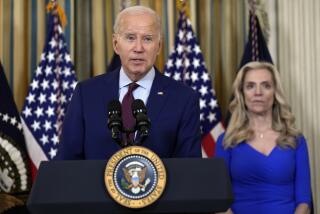U.S. Aims New Antitrust Policy Abroad : * Trade: The change permits the Justice Department to challenge anti-competitive practices in foreign markets. Japan protests.
- Share via
WASHINGTON — In an effort to defend U.S. business interests overseas, the Justice Department on Friday amended its antitrust enforcement policy to enable it to challenge foreign businesses that boycott U.S. products, rig bids or otherwise block access to their markets.
Although department officials said the policy shift is “not aimed at particular foreign markets,” the Japanese Foreign Ministry immediately objected to the move on grounds that it is “not permissible under international law.”
The change represents a response to growing concern that foreign business interests, particularly in Japan, have benefited from relatively unrestrained access to U.S. markets but have prevented American firms from enjoying the same entry to their markets.
Since 1988, the Justice Department’s antitrust division has adhered to an enforcement guideline that barred it from challenging anti-competitive conduct in foreign markets unless it could show direct harm to U.S. consumers. That requirement has now been removed.
“Applying the antitrust laws to remove illegal barriers to export competition makes sense as a matter of law and policy,” said Atty. Gen. William P. Barr, explaining the policy change. “Our antitrust laws are designed to preserve and foster competition, and in today’s global economy competition is international.”
To assert legal jurisdiction over foreign business interests, however, the government will have to show that the targeted firm or individual “had a physical presence in the United States” sufficient to bring it under the reach of U.S. courts, said James F. Rill, assistant attorney general for antitrust.
In the case of Japan, the policy could be applied to a wide range of commercial interests with manufacturing operations, sales outlets or other business connections in the United States, including auto makers and electronics firms.
The department cited as an example a 1982 case involving Japanese trading companies that allegedly attempted to fix prices they paid to Alaskan seafood processors for crab meat.
In a prepared statement, the Japanese Foreign Ministry said it had raised repeated objections to the new policy, most recently in a March 25 letter to Barr and Secretary of State James A. Baker III.
“The position of the government of Japan on this matter is that such application of the U.S. antitrust law would constitute extraterritorial application of domestic laws, which is not permissible under international law,” the ministry said.
“It is regrettable that such a policy change was made in spite of Japan’s repeated appeals,” the statement continued. “The government of Japan expects prudent handling hereafter by the Department of Justice in the application of the law.”
Barr said that under the amended policy, the department will take action against a foreign cartel that deliberately limits purchases from U.S. exporters or depresses the prices they receive. Likewise, he said, the department will use the policy in response to a boycott of American goods or services organized by competitors in foreign markets.
Rill emphasized that the affected countries will be consulted and foreign policy implications weighed before any action is taken.
U.S. Trade Representative Carla Anderson Hills, whose office initially had questioned the policy shift, said Friday that she considered it “an appropriate interpretation of our Sherman (Antitrust) Act.”
Rill would not say whether the Justice Department had refrained from bringing antitrust suits against foreign parties during the four years that the consumer-injury restriction had been in effect.
He also would not disclose whether any such cases are now under investigation, but noted that “the proper thing” to do before embarking on an enforcement effort is to announce that the policy has been changed.
In a background paper accompanying the policy shift, the department cited a 1977 antitrust guide for international operations that listed two purposes for applying the laws to international trade.
They were protecting U.S. consumers from restraints that either raise the price or limit their choice of imported or domestic products and protecting American export and investment opportunities against privately imposed restrictions.
More to Read
Inside the business of entertainment
The Wide Shot brings you news, analysis and insights on everything from streaming wars to production — and what it all means for the future.
You may occasionally receive promotional content from the Los Angeles Times.








